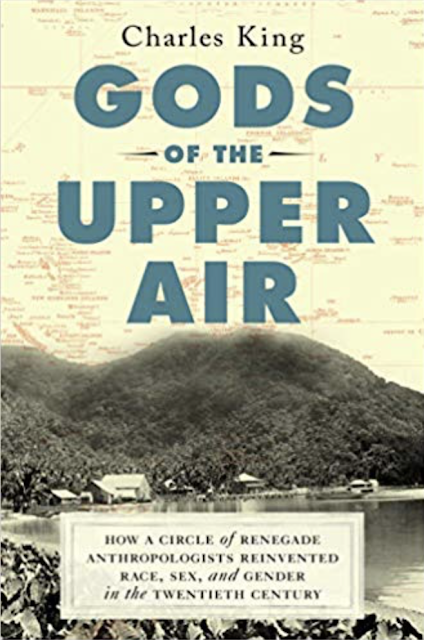"Gods of the Upper Air: How a Circle of Renegade Anthropologists Reinvented Race, Sex, and Gender in the Twentieth Century" by Charles King (2019)
I've never been fond of the discipline of Anthropology. I understood its merits from a distance, but I couldn't bring myself to try to comprehend how someone - a scientist, no less - could remain morally sound by their objectification of a group of people held steadfastly together by a supposedly empirical view of race, ethnicity, culture, and/or gender. That is precisely the reason why I needed to read this book on the development and evolution of Anthropology in the 20th century. Gods of the Upper Air: How A Circle Of Renegade Anthropologists Reinvented Race, Sex, and Gender in the Twentieth Century (2019) helped me understand that the Anthropological mission, as shaped by Franz Boas, Margaret Mead, Zora Neale Hurston and still others was - and is today because of them - a scientific inquiry aimed to breach ideologies of racism and sexism that led to some of the worst disasters humanity has faced. Author Charles King uses a historical approach in this nonfiction text, showing how incongruous people act, and think, in order to protect their egos as well as the status quo of power; for example, just think about the United States fighting with the Allies during WWII in order to stop the ongoing Holocaust in Europe, while simultaneously imprisoning, in much the same way as the Nazis did, thousands of people from Japanese descent on American soil.
"The concept of race, Boas believed, should be seen as a social reality, not a biological one - no different from the other deeply felt, human-made dividing lines, from caste to tribe to sect, that snake through societies around the world. In the arena of sex, too, the lives of women and men are shaped not by fixed exclusive sexualities but by flexible ideas of gender, attraction, and eroticism that differ from place to place. The valuing of purity - an unsullied race, a chaste body, a nation that sprang fully formed from its ancestral soil - should give way to the view, validated by observation that mixing, rather than separation, is the natural state of the world." (p.9)
"'I believe that in every person and people, renouncing tradition in order to follow the trail of the truth involved a very severe struggle,' he [Boas] wrote... the single greatest lesson he was learning, he said, was 'my notion of the relativity of all education.'" (p. 29)
Really, the hallmark of Anthropology that King makes sure his readers understand, is that it is a discipline very much interested in the notion and proof of Cultural Relativity; that beliefs, such as racial superiority, thought of as inherent and God-given, are actually products of an environment and society, and furthermore, that other groups of people, also products of a environment and society, may have extremely different beliefs, such as perhaps those aligning with paganism, that are equally and just as importantly, valid. All of us are aware how difficult it is to step into the world today, what with all the various opinions, political or otherwise, being shouted out from all different directions at once and at no one in particular, each man determined to show that they are in the right. Imagine how much more difficult it was for a man like Boas (a German man of Jewish descent) to break into academia with radical ideas that threatened the current power structures keeping certain people in control of large swathes of economy in every arena.
"With the passage of the Indian Appropriation Act of 1871, Congress rejected the old system of negotiating with Indian tribes. Washington no longer saw indigenous groups mainly as collectivities, homegrown nations with which it concluded formal treaties, as it did with foreign powers. From this point forward, individual Indians were to be treated as 'wards' of the federal government. They were now placed in a legal netherworld between foreigners and full citizens, a status that would only come several decades later. Their tribal identities ceased to be the concern of state officials and became instead the purview of artifact collectors and museum curators." (p. 40)
When such political conflicts, clashes, and a complete reorganizing a person or people's sense of self occurs, we can only expect muddy waters, especially in the realm of objective science, a noble quest that, as societies merge, only becomes ever more difficult. One ethnologist's - John Wesley Powell's - - take on this, is quite poetic:
"The stages of progress often blended into one another. 'To the scientific man the absolute light and the absolute darkness are never found, but the phenomena of light and darkness cover infinite degrees of chiaroscuro with absolute light on one hand and absolute darkness on the other, beyond the boundaries of observed phenomena and existent only in statement.' The ethnologist was meant to live in the half-light, to study the frontiers between the stages of human progress and to describe how different peoples have traveled from one era of human culture to the next; the development of languages and other specific characteristics that define each of them; the various institutions - from tribes to states - that enable them to remain coherent units; and their changing opinions about life and the universe... their 'mentations,' as Powell had it." (p. 44)
What is really cool about Gods of the Upper Air is that readers will get to grasp how different Anthropologists, primarily Boas, Mead, and Hurston, approached the same discipline in distinct and differing ways. Boas began by simply speaking to native people (as he did on Baffin Island), learning bits of their language, and conversing with them. Mead lived and worked with native peoples and recorded her experience (in places other than the U.S. such as Samoa). Hurston's innovative way was to collect folklore from the displaced peoples (exclusively the black communities in the American South) to understand their ways of storytelling. All of these approaches, coming together through lived experience, data collecting, and a reworking of hierarchy by a shifting of literal and metaphorical perspectives scientifically, come to some very insightful conclusions. King remarks on his thoughts:
"Societies that privilege the idea of guilt typically speak in terms of absolute moralities. They see an ethical life as one in which an individual struggles between poles of good and evil. They have concepts such as transgression, unlawfulness, sin, and confession. Their rituals strive for expiation - the desire to expunge an act that has contravened an explicit code of conduct. Societies that privilege shame, on the other hand, see things differently. Bad actions are not those that step over an explicit line but rather those that are inappropriate, unseemly or out of keeping with a given circumstance. Unlike guilt, shame is hard to relieve. No confession can mitigate it, no atonement can lessen it. A sense of shame is always the product of how others see your actions, which means that you are always on guard: it is impossible to be sure exactly which behaviors will be shameful and which ones not." (p. 328-329)
Lastly, towards the end, King quotes the theorist Clifford Geertz:
"'That the world does not divide into the pious and the superstitious; that there are sculptures in jungles and paintings in deserts;... that the norms of reasons were not fixed in Greece, the evolution of morality not consummated in England. Most important, we were the first to insist that we see the lives of others through lenses of our own grinding and that they look back on ours through ones of their own." (p.343)




Comments
Post a Comment